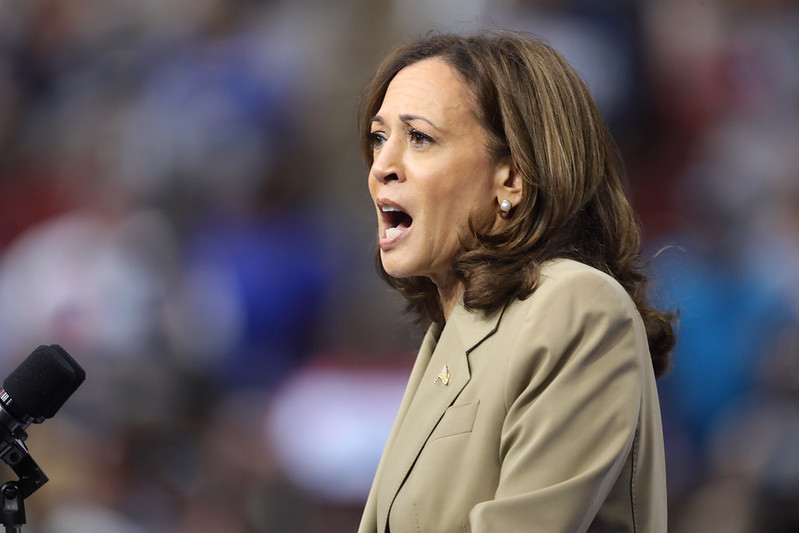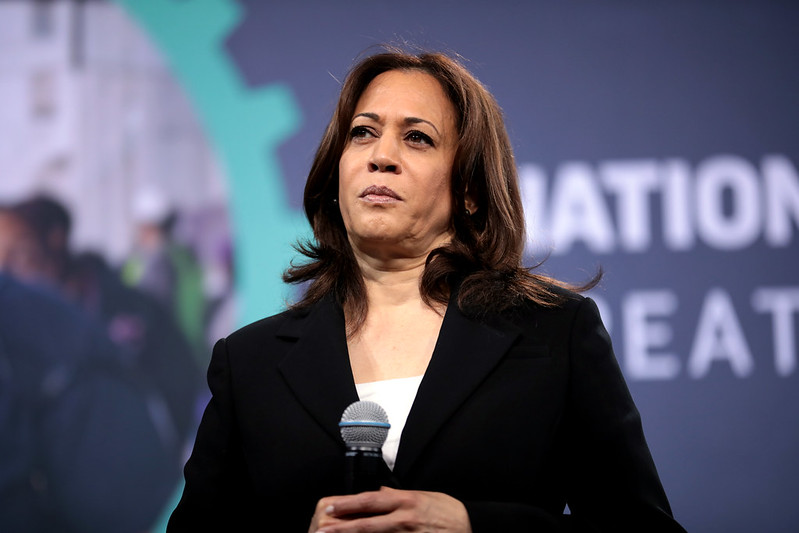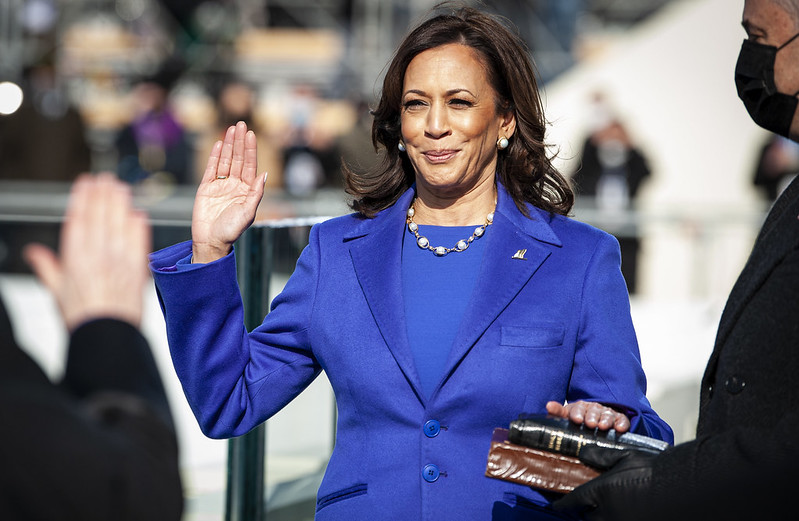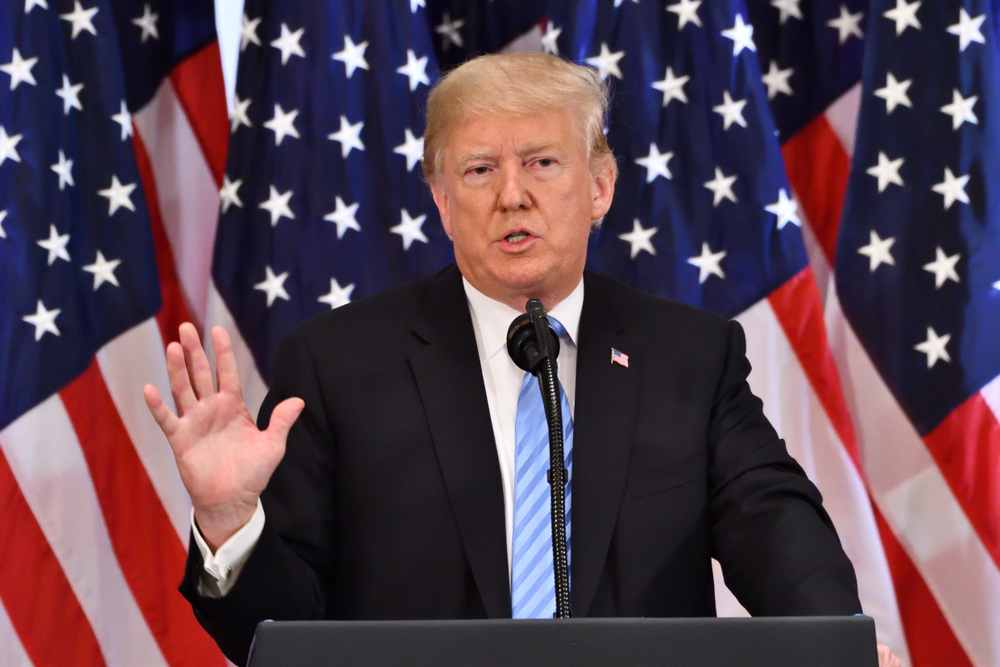People Are Saying Kamala Harris Was ‘Right’ After Eerie Warning About Trump Resurfaces

Sometimes the words we dismiss come back to demand our attention. Sometimes, warnings we ignore return with the uncomfortable truth. Currently, across social media platforms and in political discussions, people are revisiting speeches from 2024 with fresh eyes and growing unease.
A former Vice President made bold predictions during her campaign. She painted pictures of economic chaos, democratic breakdown, and constitutional crisis. Many called her warnings dramatic. Others labeled them fear-mongering. Some accused her of exaggerating threats that would never materialize.
But what happens when those predictions start coming true? What do we do when the scenarios we hoped would never unfold begin playing out exactly as forecasted? How do we process the reality that someone tried to warn us, and we didn’t listen carefully enough?
Kamala Harris spoke with urgency throughout 2024. Her voice carried the weight of conviction as she described potential futures most Americans couldn’t imagine. Now, months into Trump’s second presidency, her words echo with eerie accuracy that’s impossible to ignore.
Campaign Warnings Nobody Wanted to Hear
@ashariexpressess Kamala Harris told you. Credit for the edit goes to a really good Twitter friend of mine, Fabi. #tiktokviral #fypシ゚viral #fy #kamalaharris #KHive #politicaltiktok #shewasright #shetoldyall
♬ original sound – Jon Ossoff🤩
During her 2024 presidential campaign, Harris painted stark pictures of what another Trump presidency might bring to America. Rally after rally, interview after interview, she detailed specific threats she believed his policies would create for ordinary families.
Economic warnings dominated her speeches. Harris repeatedly cautioned that Trump’s proposed tariffs would function like a massive tax increase on consumers. She described them as acting like a “20% sales tax” on basic goods that families depend on daily. While Trump promised these policies would strengthen America’s economy, Harris predicted they would devastate household budgets instead.
Beyond economics, Harris raised alarms about democracy itself. She warned that Trump planned to target political opponents, free January 6 rioters, and implement a conservative blueprint called Project 2025. Despite Trump’s public denials about connections to that plan, Harris insisted voters should prepare for its implementation.
Her speeches took on prophetic tones when she described Trump as “unstable” and warned his leadership could lead to unchecked power. During one memorable address at the Ellipse in Washington, D.C., where the January 6 attack began, she urged voters to see Trump as a direct threat to democratic institutions.
Harris painted scenarios where constitutional crises would emerge from conflicts between branches of government. She warned about the weakening of checks and balances, the erosion of democratic norms, and the dangerous concentration of executive power.
Her Predictions Playing Out
Since Trump took office in January 2025, multiple Harris predictions have materialized with disturbing accuracy. Economic reports now show Trump’s tariffs disrupting markets exactly as she warned they would. Economists estimate these policies will cost the average American household between $1,600 and $2,000 annually.
Project 2025 elements are moving forward despite Trump’s campaign denials. Deregulation efforts and immigration reforms outlined in that blueprint are becoming administration priorities. Harris’s warnings about this agenda being implemented seem increasingly prescient.
Constitutional concerns Harris raised are manifesting through conflicts between Trump’s administration and federal courts. Tensions with Congress over executive authority echo her predictions about democratic institutions facing unprecedented pressure.
Reports suggest that checks and balances are weakening, as Harris had warned they would. Court orders face challenges from administration officials. Traditional boundaries between branches of government appear increasingly strained.
Social Media Says “We Should Have Listened”

TikTok and X have become platforms where Harris’s warnings gain new life through viral content. Users create video compilations showing her campaign speeches alongside current news reports about Trump’s actions. These side-by-side comparisons highlight how accurately she predicted current events.
Comments sections overflow with expressions of regret and frustration. Many users express sentiment that “America ignored her at its own peril.” Online communities are revisiting campaign footage with fresh perspective, seeing prophecy where they once saw partisan politics.
Hashtags trend around themes of unheeded warnings and political prescience. Young voters are particularly drawn to content that shows Harris’s predictions coming true. Social media algorithms amplify these discussions, spreading awareness of her accurate forecasts to broader audiences.
Harris Breaks Her Silence: No More Playing Nice
After weeks of relative quiet following the election, Harris stepped back into public view with renewed force. At the Emerge Gala in San Francisco in April 2025, she delivered her first major post-election speech with no diplomatic restraint.
Harris directly attacked Trump’s economic policies, calling his tariffs “reckless” and accusing his administration of creating “the greatest manmade economic crisis in modern presidential history.” She accused him of abandoning fundamental American values in pursuit of divisive policies.
Her speech praised Democratic leaders, such as Senators Cory Booker and Bernie Sanders, for continuing to speak out against the administration’s policies. Harris positioned herself as part of a growing resistance movement challenging Trump’s agenda through legal and political channels.
Speculation about her political future intensified following this appearance. Some observers suggest she might run for California governor. Others believe she’s positioning herself for another presidential campaign in 2028.
Remember the 1930s: Harris Gets Historical

In a recent interview at the 2025 Australian Real Estate Conference, Harris made her most chilling historical comparison yet. She drew parallels between Trump’s “America First” policies and the isolationism of the 1930s that many historians believe helped pave the way for World War II.
“It’s important that we remember the 1930s. It’s important that we remember that history has taught us that isolation does not equal insulation,” Harris warned, emphasizing how current policies mirror dangerous historical patterns.
Her comparison suggests she sees Trump’s approach as repeating mistakes that led to a global catastrophe. Harris stressed the importance of relationships, trust, and international cooperation in preventing historical disasters from recurring.
Taking Aim at Elon: When Empathy Becomes the Enemy
Harris also targeted billionaire Elon Musk’s influence within Trump’s administration. She referenced his controversial comments about empathy being a weakness of Western civilization, made during an appearance on Joe Rogan’s podcast.
“There was someone that is very popular these days, at least in the press, who suggested that it is a sign of weakness of Western civilizations to have empathy,” Harris said, clearly alluding to Musk without naming him directly.
She defended empathy as a source of strength rather than vulnerability, directly contradicting Musk’s assertion that Western civilization suffers from “civilizational suicidal empathy.” Harris argued that caring about others demonstrates strength and moral courage.
Musk had claimed that empathy represents “a bug in Western civilization” that adversaries exploit. Harris countered that empathy, curiosity, and concern for others’ well-being represent core values worth defending.
Harris’s Recipe for Resistance

Harris identified fear as a central tool of Trump’s governance strategy. She argued that his administration deliberately tries to instill fear in people to encourage broader compliance with controversial policies.
“President Trump and his administration and their allies are counting on the notion that fear can be contagious. They are counting on the notion that if they make some people afraid, it will have a chilling effect on others,” Harris explained during her San Francisco speech.
But she insisted that courage spreads just as easily as fear. Harris praised judges and universities for pushing back against administration threats. She highlighted Americans speaking out against violations of court orders and due process rights.
Her message emphasized that resistance requires sustained effort rather than momentary outrage. Harris called for a long-term commitment to defending democratic institutions and constitutional principles.
What Happens When Nobody Listens to Warnings
Harris’s accurate predictions raise uncomfortable questions about how society processes political warnings. Female politicians often face dismissal when they raise concerns about threats to democracy or economic stability. Their warnings get labeled as emotional overreactions rather than serious analysis.
Economic predictions that seemed pessimistic during the campaign season now appear conservative in light of the actual impacts. Families experiencing rising costs due to tariffs represent real consequences of dismissed warnings.
Democracy warnings that seemed dramatic during election season feel increasingly urgent as constitutional tensions escalate. Harris’s predictions about institutional breakdown appear less theoretical and more immediate.
Harris Hints at Her Political Future

Harris’s recent public appearances suggest she’s building a foundation for continued political involvement. Her criticism of Trump’s policies positions her as a leading voice of opposition. Speculation about future campaigns reflects recognition of her growing influence.
Whether she pursues California’s governorship or another presidential run, Harris has established herself as someone willing to speak uncomfortable truths. Her track record of accurate predictions gives weight to future warnings she might issue.
Her role as opposition leader is taking definitive shape. Harris seems committed to sustained resistance rather than temporary criticism.
Why Being “Right” Feels So Wrong
Accuracy in political predictions brings little satisfaction when those predictions involve economic hardship and erosion of democracy. Harris’s prescient warnings represent a case where being right feels terrible rather than vindicating.
When worst-case scenarios become reality, society faces difficult questions about why warnings went unheeded. Harris’s example shows the cost of dismissing political predictions as partisan rhetoric rather than serious analysis.
Moving forward requires learning from past mistakes while addressing current challenges. Harris’s voice serves as both a reminder of missed opportunities and a call to action for future decisions. Her warnings remind us that ignoring uncomfortable truths rarely makes them disappear.
Loading...

